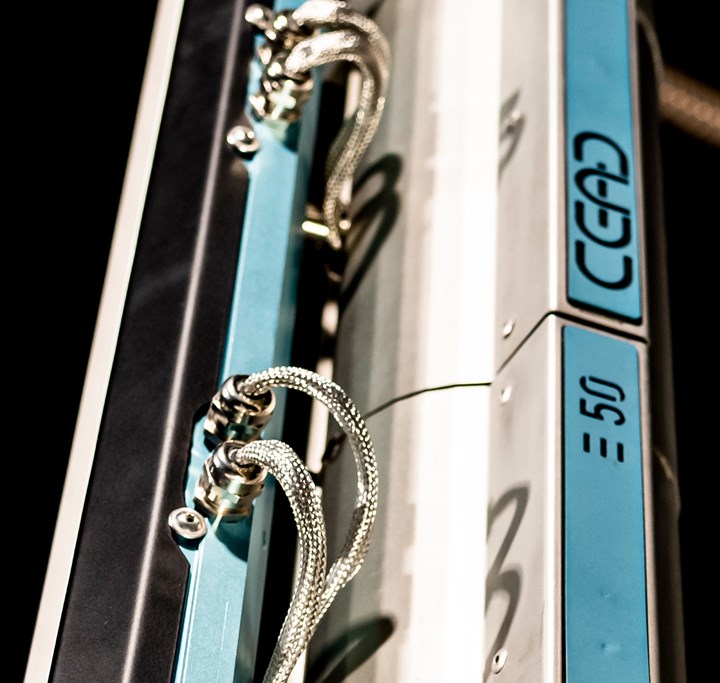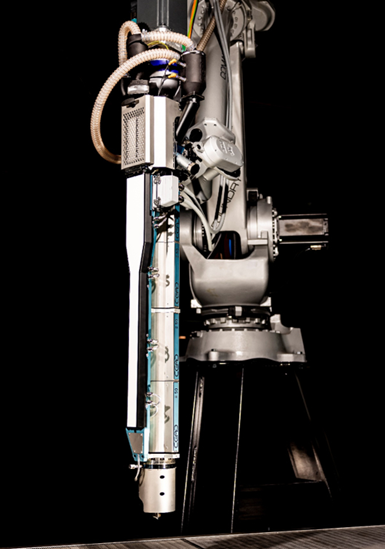CEAD launches new E50 Robot Extruder for larger 3D-printed composites
New option offers higher material output (e.g., 84 kg/hr) and thermoplastic melt temperatures up to 400°C.

All photo credit: CEAD
More than two years ago, composites additive manufacturing supplier CEAD (Delft, Netherlands) installed its first robot extruders in the Netherlands. That first model, the E25, is a custom-designed, high-temperature, stand-alone printhead dedicated for large-scale 3D printing with a maximum output of 12 kilograms/hour.
The E25 is currently installed worldwide: many universities such as ETH Zurich, University of Stuttgart and Tampere University integrated the printing head on a robotic arm. Also, many companies (such as Rapid Prototyping) integrated the extruder on their existing CNC machine to start exploring 3D printing.
Though very satisfied with the E25 and its capabilities, CEAD began to receive requests for greater material output to print larger parts. In response, the company has launched a new model of its Robot Extruder: the E50. First tests show an output of 84 kilograms/hour with PP30%GF (polypropylene reinforced with chopped glass fiber at 30% by weight) at only 60% of the E50’s maximum speed. Nozzle sizes for the E50 range from 8 to 20 millimeters in diameter.

The E50, just like the E25, is delivered standard with thermoplastic pellet material transport, mounting bracket and Siemens PLC-based control. It can be controlled by two signals — analog 0-10v and digital 0-24v — offering a robust control system for a robotic arm or CNC gantry to control the extruder. Using profinet is also an option.
With a 15-kilowatt motor and capability for melt temperatures of up to 400°C, this printhead is able to process the high-performance, fiber-reinforced materials such as carbon-filled PESU and PEEK. A 400-liter dryer for pellets, fully integrated with the proprietary transport system, is an option for the system.
The Robot Extruder E50 will also be featured in the larger BEAD machines, CEAD’s newest gantry-based solution produced in partnership with CNC equipment specialist Belotti (Suisio, Italy). BEAD is a hybrid solution combining the finish and tolerances of subtractive manufacturing with the sustainability of additive manufacturing. With dimensions ranging from 6-50 meters in length, 2.6-11 meters in width and 1.5-5 meters in height, the E50 robot extruder is the perfect fit for these larger systems, allowing a greater material output. BEAD combines the best of both worlds: making it possible to 3D print the near net shape of a part and afterward mill it to the required tolerances.
For more details, contact info@ceadgroup.com
Related Content
-
Active core molding: A new way to make composite parts
Koridion expandable material is combined with induction-heated molds to make high-quality, complex-shaped parts in minutes with 40% less material and 90% less energy, unlocking new possibilities in design and production.
-
TU Munich develops cuboidal conformable tanks using carbon fiber composites for increased hydrogen storage
Flat tank enabling standard platform for BEV and FCEV uses thermoplastic and thermoset composites, overwrapped skeleton design in pursuit of 25% more H2 storage.
-
Large-format 3D printing enables toolless, rapid production for AUVs
Dive Technologies started by 3D printing prototypes of its composite autonomous underwater vehicles, but AM became the solution for customizable, toolless production.













